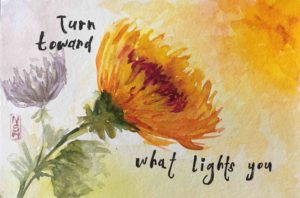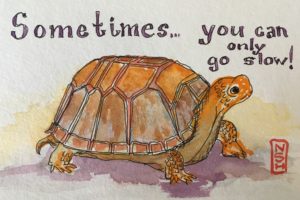 I shouldn’t have waited to call 911 for help. Actually, not really 911 – the non-emergency one. The ups and downs got to us.
I shouldn’t have waited to call 911 for help. Actually, not really 911 – the non-emergency one. The ups and downs got to us.
We’ve been enjoying life each day in new ways. We did make it to the concert two days ago and had a blast. The Venice Art Center was an easy venue for Larry – small, no stairs or ramp, or tables, to navigate around. The band, Mike Imbasciani and the BluezRockerz, played blues from 1928 to 2018, influence by rock, folk, and country. They were loud and fun and people were dancing in their seats and in the aisle. Big up!
Yesterday we had visits from the CNA and the hospice nurse to do wound care on the pressure sore on his heal, which didn’t look any better. Bummer. The nurse also brought up the fact that he is up for recertification in hospice. If he gets “live discharged,” meaning they don’t think he qualifies, we’ll have to reconnect with all his doctors, go through a sleep study to get his Bi-pap machine ordered, and see a respiratory specialist to find a way to get his Cough Assist and suction machines again. And no more CNA for showers. UGGG!!! Big down! We’ll worry about that when the time comes.
It was a beautiful afternoon and Larry came out in his wheelchair to walk Bear with me. Then we lit a fire in the firepit and enjoyed cocktails outside, while I cooked dinner on the grill. His butt hurt sitting in his wheelchair, so after dinner we moved him to his lift recliner. We watched a fun mystery on TV and ate chocolate cake. Big up!
Then, in trying to transfer him back to his wheelchair to go to bed, something happened. I was holding him and he was leaning on the walker but somehow we lost his balance and he didn’t have the strength to hold himself up and I didn’t either so he slid to the floor. No fall, no crash, no injuries. But now he’s on the floor. Big down – literally and figuratively!
Months ago, that wouldn’t cause much of a problem. We had a method of turning him to one side and getting my knee under his armpit and then helping him get one foot under him and with a chair nearby to lean on we could get him up.
Normally I’d call a neighbor for help but it was 10 PM. I didn’t think we’d be able to do it ourselves but he wanted to try. We tried once and he felt so heavy. I almost lifted him myself but couldn’t. He insisted on trying going the other way, moving the wheelchair around him. I said “one more try is all I’ll give you.” No dice. I called the non-emergency 911, they came (in a firetruck with lights flashing so we’ll have neighbors calling today) picked him up and all was well.
Except…
This morning I can hardly walk. Somehow I did something to my foot in my attempts to get him up. It’s hurting in multiple weird ways. Huge down!
It’s frustrating, uncomfortable, and inconvenient. And I feel stupid for not calling for help in the first place.
Lesson to self – things have changed. What used to work may not work.
 I learned five important caregiver lessons from a recent respite weekend. I went on a
I learned five important caregiver lessons from a recent respite weekend. I went on a 
 I confess that I am an angry and guilty and tired caregiver. Now that it’s September, I realize it has been a year without a break. Not even a day. Not more than a few hours. Of course, that is even more true for him!
I confess that I am an angry and guilty and tired caregiver. Now that it’s September, I realize it has been a year without a break. Not even a day. Not more than a few hours. Of course, that is even more true for him! I’m sitting at my husband’s hospital bedside thinking about what I’ve learned here, the lessons from our hospital stay. Lessons about advocacy, about asking lots of questions, about being the expert on his care. And the lessons from our hospital stay that I learned about taking care of myself, or at least the penalties for not caring for myself. We are here after
I’m sitting at my husband’s hospital bedside thinking about what I’ve learned here, the lessons from our hospital stay. Lessons about advocacy, about asking lots of questions, about being the expert on his care. And the lessons from our hospital stay that I learned about taking care of myself, or at least the penalties for not caring for myself. We are here after  “Make sure to take care of yourself,” well-meaning friends say. Self-care is important, the caregiver blogs say. “Are you taking care of yourself?” my doctor asks.
“Make sure to take care of yourself,” well-meaning friends say. Self-care is important, the caregiver blogs say. “Are you taking care of yourself?” my doctor asks. It’s all too easy to lose yourself to caregiving. It’s an insidious process.
It’s all too easy to lose yourself to caregiving. It’s an insidious process. I woke up with vertigo – the bed was spinning, the room was spinning. But that didn’t stop my caregiver responsibilities. He still needed help going to the bathroom and getting back into bed. I tried going back to bed but it was worse. I got up with the hopes the dizziness was less when I was upright. Plus I had to feed and walk the dog. Brutal. It was a short walk. I had a little tea and toast. Couldn’t face coffee.
I woke up with vertigo – the bed was spinning, the room was spinning. But that didn’t stop my caregiver responsibilities. He still needed help going to the bathroom and getting back into bed. I tried going back to bed but it was worse. I got up with the hopes the dizziness was less when I was upright. Plus I had to feed and walk the dog. Brutal. It was a short walk. I had a little tea and toast. Couldn’t face coffee. I was cranky with my husband yesterday as I tried to complete a project. In finishing I had to call a neighbor to help put boxes up on the high shelves in the garage – something Larry could have easily done in years past. As I do all this, I wonder if he is sitting there frustrated that he can’t help. Or is he so in his own world of challenges and pain that he doesn’t even notice?
I was cranky with my husband yesterday as I tried to complete a project. In finishing I had to call a neighbor to help put boxes up on the high shelves in the garage – something Larry could have easily done in years past. As I do all this, I wonder if he is sitting there frustrated that he can’t help. Or is he so in his own world of challenges and pain that he doesn’t even notice?